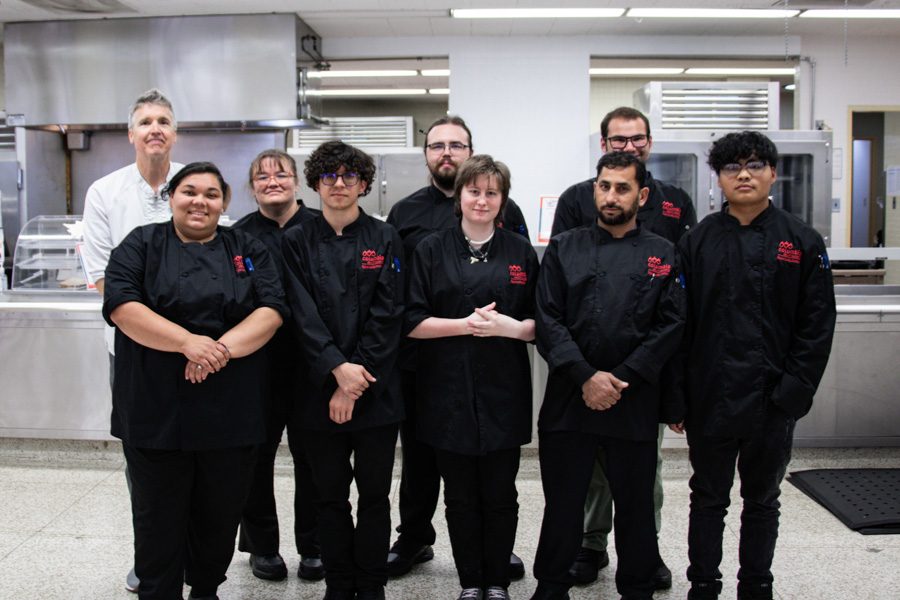
Home » Nonprofit helps clients gain successful community employment
Nonprofit helps clients gain successful community employment

Eight students recently completed the Opportunity Kitchen program, a flagship program of Columbia Ability Alliance dedicated to empowering individuals with barriers to employment through specialized vocational training in the food service industry. Graduates from this class include Amanda, Dawn, Seann, Nikki, Jordan,Joshua, Wahidullah and Mateo. Their last names were not disclosed.
Courtesy Columbia Ability AllianceOctober 14, 2024
For those facing barriers to employment, Columbia Ability Alliance offers a lifeline.
With a focus on skill development, job coaching and community partnerships, the Kennewick-based nonprofit empowers clients to achieve success in the workplace.
The organization served 73 clients and provided 2,650 hours of job coaching between June 2023-24. As a result, 33 clients gained meaningful employment with Columbia Ability Alliance’s employer partners, the agency said.
Now, Columbia Ability Alliance is being asked to extend its services to Walla Walla.
“We truly are on our way to building a better community, and we’re doing it through accessibility and inclusion, and everybody gets to enjoy that,” said Michael Novakovich, president and CEO of Columbia Ability Alliance.
Opportunity Kitchen
Some of Columbia Ability Alliance’s successes have been through the Opportunity Kitchen program, designed to help participants learn both vocational skills and soft skills. It’s free to qualified students.
In the past fiscal year, 15 students graduated from Opportunity Kitchen, which provided nearly 900 hours of training. This fall, eight students graduated from graduated from the program.
The executive training chef who works with the students calls the program “life skills and knife skills,” Novakovich said.
Part of what students learn are culinary skills, exploring several different environments within the hospitality industry, including spending time at a Columbia Ability Alliance-run cafe at the Richland Federal Building and catering meals during nonprofit or corporate events.
At the conclusion of the 12-week program, students graduate with a food handler card.
But the students also work with a life skills teacher to learn vital soft skills throughout the course. Accountability, resume building, dealing with conflict, teamwork and communication are all a part of the program.
If graduates choose not to go into food service, “those soft skills are going to allow them to be successful in other environments as well,” Novakovich said.
One success story he shared was of two young adults who would only communicate with their father through texts. While participating in Opportunity Kitchen, they began talking with their dad about the experiences they had through the program.
“It’s like they just came alive,” Novakovich said. “And now one of them works for us. One of them is working for another local eatery, and they’re both doing very, very well.”
Paths to employment
Columbia Ability Alliance also offers a number of individualized roads to successful employment through its Employment Services department.
To get the word out, the nonprofit sends out newsletters, works with agencies and school districts and participates in job fairs.
Once a client gets in touch with the department, “we’ll have you come in and sit down and talk with us, what you’re wanting, what your needs are,” said David Haldeman, divisional programs manager of the nonprofit’s Employment Services department. They’ll help match job seekers to a program that fits their qualifications.
There are three different programs that can help support employment goals: Developmental Disabilities Administration, or DDA, Foundational Community Support, and Division of Vocational Revision, or DVR.
The programs differ somewhat in their functions and clients. DDA focuses on resume-building, job skills, job coaching and long-term support. That long-term support could help clients until they’re independent or even throughout their career.
DVR, on the other hand, is intended to be more short-term, helping those who may be ready for employment but need a little extra support. The program helps with independent living skills and finding community employment.
Clients in this program can participate in work-based learning, where they gain work experience on Columbia Ability Alliance’s payroll for six to 12 weeks.
Once employed in the community, they have three months of follow-along service to ensure their success.
The third program, Foundational Community Support, can be either short-term or longer if clients need more check-ins. It’s aimed at clients who have more barriers, whether that means they are on state insurance, have an underlying mental health condition or were recently incarcerated.
Like DDA, clients work on resume-building and can receive job coaching and job development.
In addition to these programs, Columbia Ability Alliance offers benefits planning. Some clients with disabilities who are on Social Security can only work a certain number of hours before losing their benefits, Haldeman said.
Columbia Ability Alliance’s benefits planner can look up a client’s information to help them plan. “She can tell you exactly how many hours they can work before it will impact this benefit, and what will happen if we lose that benefit, and how we’ll impact this benefit with this benefit,” Haldeman said.

Cameron is an employee of Columbia Ability Alliance’s Solutions department, which produces welding hoods for the U.S. Navy. Those employed in the program work on contract fulfillment projects where they can hone technical skills while earning a paycheck. His last name was not disclosed.
| Courtesy Columbia Ability AllianceFree programs
The programs offered through Employment Services are funded through contracts, either with the state or the county, so that clients can access these programs for free.
Some programs associated with Columbia Ability Alliance’s community center are paid, but “we try to support people best we can and keep our rates very low so it’s now a burden or barrier for individuals,” Novakovich said.
Columbia Ability Alliance’s subsidiary businesses can help fund services or programs that don’t have a contract. Paradise Bottled Water, all four area Roundtable Pizza restaurants and CI Information Management are all separate businesses under the Columbia Ability Alliance umbrella, Novakovich said.
When it comes to helping clients find employment, the emphasis is on “community-based employment,” he said, rather than directly employing clients at Columbia Ability Alliance.
While it has worked out that some of the Opportunity Kitchen graduates went on to work at Roundtable, these business arms “weren’t intended to be employment vehicles for us, they were truly revenue generators to support the nonprofit mission services,” Novakovich said.
Community employment
Community partnerships are a vital part of what Columbia Ability Alliance does. They’re “where the ‘alliance’ in our name comes in. We couldn’t get any of this done if we didn’t have the community opening their doors for employment opportunities or supporting us in various fashions,” Novakovich said.
Columbia Ability Alliance employees might spend time “job carving” in the community. Haldeman explained that this means going to a business that might not have a position available and asking them to create one.
That might look like, “‘Hey, look, we have an individual that is really good at janitorial. This is the things that they can do. Would you be willing to carve that position, kind of maybe one, two hours a week?’” Haldeman said.
Sometimes the job carving can include parceling out a piece of a current employee’s duties, like a clerical operation, Novakovich said.
Not only does that help the client to have meaningful employment, but “the person that was kind of picking up the other duties as assigned, now they can take their talents and focus it where they’re most productive and they probably enjoy doing the work,” he said.
When Columbia Ability Alliance’s clients are employed in the community, it’s beneficial not only for the client, but for the business they work at and those they work with.
“You get a lot of benefits when you’re hiring an individual with a disability,” Haldeman said. “Team morale, you’re going to get productivity, you’re going to get a loyal employee that’s going to show up on time and not call out that much.”
“It’s this huge winning proposition,” Novakovich said. “It impacts the life of an individual that we place, but it has far-reaching impacts for businesses, and then that filters out into the community.”
Walla Walla expansion
Columbia Ability Alliance’s success has not gone unnoticed. Walla Walla County reached out to the organization to help serve clients in that area. And the alliance is working to hire someone from Walla Walla to work remotely from that area.
“We’ll work to grow relations down there and do a good job to serve in their community, too,” Novakovich said. He added that Walla Walla County administers some programs that Benton County does not, “and so we’re hopeful to gain some learning, understanding, and then bring those here to the Tri-Cities as well.”
The contract to work in Walla Walla was set to begin Oct. 1.
Local News Charitable Giving & Nonprofits Labor & Employment Nonprofits
KEYWORDS October 2024
Related Articles
Related Products




